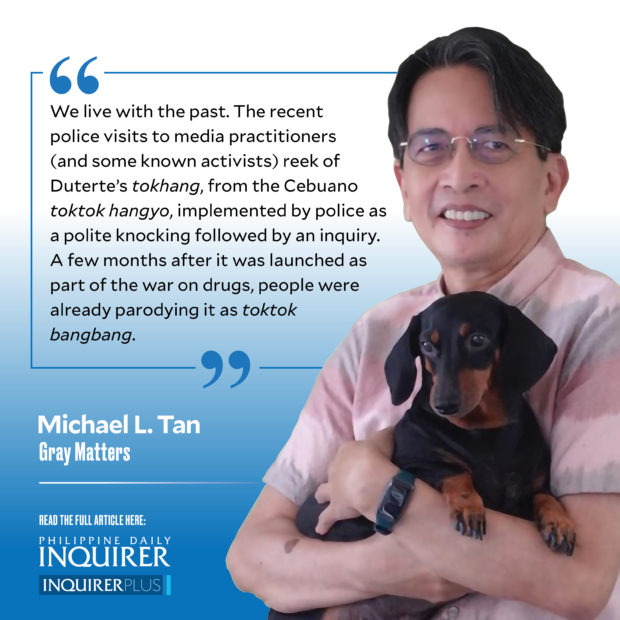Bad cop, good cop?
Following public uproar, the Philippine National Police spokesperson Col. Jean Fajardo declared in a press conference that the police meant no harm when they visited to check about the journalists’ safety shortly after the assassination of broadcaster Percival Mabasa (Percy Lapid).
But the “honored” media people, as well as politicians (even law-and-order types) saw the visits as thinly veiled threats. Other public interpretations were that the police were out to extort “protection” money, or, worse, to case the journalists’ neighborhoods, as they would a suspected criminal, in preparation for raids … or worse.
Our police have an uphill battle when it comes to public relations, and this image problem is worsening. On all counts—corruption, violation of human rights, even their private family (families) life—the police are perceived to be worse than the military, with poor prognosis for the future.
I think of the history of our police as tied to the corruption of power, going back not just a few years, but centuries.
Our police traces its lineage back to the Spanish guardia civil, immortalized, or rather demonized, in Rizal’s novels as cruel oppressors who took their orders from Spanish friars and officials.
When the Americans came in, they instituted the Philippine Constabulary (PC), originally to fight Filipino nationalist insurgents who resisted the new colonizers, fighting a protracted Philippine-US War, the insurgents labeled as ladrones or bandits.
After the insurgency subsided, the PC remained, mainly to protect the interests of local politicians. The PC was part of the military.
In 1966, a National Police Commission was established, still under the Armed Forces of the Philippines, to supervise police forces put up in municipalities and cities, but the police were rapidly gaining a reputation for corruption and violence.
Under martial law, the Integrated National Police (INP) was established and, in 1975, put under a joint command structure with the PC. This PC-INP was again part of the AFP and gained notoriety for their violations of human rights, including violent dispersals of rallies, kidnappings, torture, and disappearances.
After the Edsa revolt, in 1991, the PNP, a civilian police force, was finally set up. The corruption continued, but violence somewhat subsided with more safeguards to protect human rights. In many communities though, especially outside of Metro Manila, the police continued to function as private armies for politicians and were at their worst during elections, the goons that went with guns and gold.
I witnessed the growing ambivalence about the police at that time, and it continues to this day. If you asked urban poor kids what they wanted to be someday, many would answer, “pulis” and I knew why—corruption, so normalized by the police.
But how normal is normal when our heart skips a beat seeing a policeman out in the street raising his arm and we react, unsure if he is just giving traffic signals or is flagging you down to extort money? I’ve had young nephews and nieces (more the latter) complaining how they are easy prey for police needing merienda.
The mixed feelings people had about the neighborhood cop were dramatically exemplified by an incident in the 1980s when I lived in Malate. I had gone out to pick up breakfast and my street friends were in a frenzy. One of the neighborhood cops had been assassinated, no one knew by whom.
People were honestly grieving for him, “Ang bait bait naman niya,” people kept repeating, meaning he was a kind man. When I asked what the circumstances were around his assassination, a street vendor replied, “Ayan, nangongolekta”—he was collecting protection money.
This relatively benign image of the neighborhood cop disappeared under Duterte, especially with the war on drugs and, later, with the Red-tagging. Duterte unleashed the police, and the military, publicly instructing them, in so many words, to shoot first, ask questions later.
We live with the past. The recent police visits to media practitioners (and some known activists) reek of Duterte’s tokhang, from the Cebuano toktok hangyo, implemented by police as a polite knocking followed by an inquiry. A few months after it was launched as part of the war on drugs, people were already parodying it as toktok bangbang.
Must it be wishful thinking to see fewer bad cops and a growing tribe of good cops?
mtan@inquirer.com.ph

















